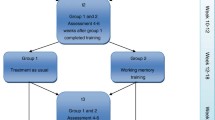Abstract
We piloted a computer program to train working memory for children with attention problems or hyperactivity who attended an urban public school serving economically disadvantaged neighborhoods. Training was conducted daily for 5 weeks during school hours. Teachers rated children’s behaviors before and after the intervention, and standardized assessments of verbal and visuo-spatial working memory were also conducted. No attrition occurred due to an inability or unwillingness on the part of children to complete the training. Overall, children’s behavior and working memory improved following training, compared to baseline. Our findings suggest that school-based working memory training may be a viable means for treating children with attention problems or hyperactivity that warrants further investigation. This approach may also overcome barriers to care delivery for economically disadvantaged children who are known to be at higher risk for poor school outcomes.
Similar content being viewed by others
References
Adams, W., & Sheslow, D. (1990). Wide range assessment of memory and learning (WRAML). Wilmington, Delaware: Wide Rang.
American Psychiatric Association. (2000). Diagnostic and statistical manual of mental disorders, text revision (4th ed.). Washington D.C.: APA Press.
Armbruster, P., Gerstein, S. H., & Fallon, T. (1997). Bridging the gap between service need and utilization: A school-based mental health program. Community Mental Health Journal, 33, 199–211.
Armbruster, P., & Lichtman, J. (1999). Are school based mental health services effective? Evidence from 36 inner city schools. Community Mental Health Journal, 35, 493–504.
Baddeley, A. D. (2000). The episodic buffer: A new component of working memory? Trends in Cognitive Sciences, 4, 417–423.
Barkley, R. A. (1997). Behavioral inhibition, sustained attention, and executive functions: Constructing a unifying theory of ADHD. Psychological Bulletin, 121, 65–94.
Biederman, J., Monuteaux, M. C., Doyle, A. E., Seidman, L. J., Wilens, T. E., Ferrero, F., et al. (2004). Impact of executive function deficits and attention-deficit/hyperactivity disorder (ADHD) on academic outcomes in children. Journal of Consulting and Clinical Psychology, 72, 757–766.
Biederman, J., Monuteaux, M. C., Mick, E., Spencer, T., Wilens, T. E., Silva, J. M., et al. (2006). Young adult outcome of ADHD: A controlled 10-year follow-up study. Psychological Medicine, 36, 167–179.
Blair, C., & Diamond, A. (2008). Biological processes in prevention and intervention: The promotion of self-regulation as a means of preventing school failure. Development and Psychopathology, 20, 899–911.
Buckner, J. C., & Bassuk, E. (1997). Mental disorders and service utilization among youths from homeless and low-income housed families. Journal of the American Academy Child and Adolescent Psychiatry, 36, 890–900.
Buckner, J. C., Mezzacappa, E., & Beardslee, W. R. (2009). Self-regulation and its relations to adaptive functioning in low-income youths. American Journal of Orthopsychiatry, 79, 19–30.
Burns, B. J., Costello, E. J., Angold, A., Tweed, D., Stangl, D., Farmer, E. M. Z., et al. (1995). Children’s mental health service use across service sectors. Health Affairs, 14, 147–159.
Conklin, H. M., Luciana, M., Hooper, C. J., & Yarger, R. S. (2007). Working memory performance in typically developing children and adolescents: Behavioral evidence of protracted frontal lobe development. Developmental Neuropsychology, 31, 103–128.
Diamond, A., Barnett, W. S., Thomas, J., & Munro, S. (2007). Preschool program improves cognitive control. Science, 318, 1387–1388.
Dickstein, S. G., Bannon, K., Castellanos, F. X., & Milham, M. P. (2006). The neural correlates of attention deficit hyperactivity disorder: An ALE meta-analysis. Journal of Child Psychology and Psychiatry, 47, 1051–1062.
Drabick, D. A. G., Gadow, K. D., & Sprafkin, J. (2006). Co-occurrence of conduct disorder and depression in a clinic-based sample of boys with ADHD. Journal of Child Psychology and Psychiatry, 47, 766–774.
DuPaul, G. J., Power, T. J., Anastopoulos, A. D., & Reid, R. (1998). ADHD rating scale—IV. Checklists, norms and interpretation. New York: Guilford Press.
Evans, G. W., & Schamberg, M. A. (2009). Childhood poverty, chronic stress, and adult working memory. Proceedings of the National Academy of Sciences, 106, 6545–6549.
Farah, M. J., Shera, D. M., Savage, J. H., Betancourt, L., Giannetta, J. M., Brodsky, N. L., et al. (2006). Childhood poverty: Specific associations with neurocognitive development. Brain Research, 1110, 166–174.
Farmer, E. M. Z., Burns, B. J., Phillips, S. D., Angold, A., & Costello, E. J. (2003). Pathways into and through mental health service for children and adolescents. Psychiatric Services, 54, 60–66.
Froehlich, T. E., Lanphear, B. P., Epstein, J. N., Barbaresi, W. J., Katusic, S. K., & Kahn, R. S. (2007). Prevalence, recognition, and treatment of attention-deficit/hyperactivity disorder in a national sample of US children. Archives of Pediatrics and Adolescent Medicine, 161, 857–864.
Hedges, L., & Olkin, I. (1985). Statistical models for meta-analysis. New York: Academic Press.
Holmes, J., Gathercole, S. E., & Dunning, D. L. (2009). Adaptive training leads to sustained enhancement of poor working memory in children. Developmental Science, 12, F9–F15.
Holmes, J., Gathercole, S. E., Place, M., Dunning, D. L., Hilton, K. A., Elliott, J. G. (2010). Working memory deficits can be overcome: Impacts of training and medication on working memory in children with ADHD. Applied Cognitive Psychology (in press).
Klingberg, T. (2006). Development of a superior frontal-intraparietal network for visuo-spatial working memory. Neuropsychologia, 44, 2172–2177.
Klingberg, T., Fernell, E., Olesen, P. J., Johnson, M., Gustafsson, P., Dahlstrom, K., et al. (2005). Computerized training of working memory in children with ADHD—A randomized, controlled trial. Journal of the American Academy of Child and Adolescent Psychiatry, 44, 177–186.
Kraemer, H. C., & Thiemann, S. (1987). How many subjects? Statistical power analysis in research. Newbury Park, CA: Sage.
Leaf, P., Alegria, M., Cohen, P., Goodman, S. H., Horwitz, S. M., Hoven, C. W., et al. (1996). Mental health service use in the community and schools: Results from the four-community MECA study. Journal of the American Academy of Child and Adolescent Psychiatry, 35, 889–897.
Luciana, M., Conklin, H. M., Hooper, C. J., & Yarger, R. S. (2005). The development of nonverbal working memory and executive control processes in adolescents. Child Development, 76, 697–712.
Martinussen, R., Hayden, J., Hogg-Johnson, S., & Tannock, R. (2005). A meta-analysis of working memory impairments in children with attention deficit/hyperactivity disorder. Journal of the American Academy of Child and Adolescent Psychiatry, 44, 377–384.
Mezzacappa, E. (2004). Alerting, orienting and executive attention: Developmental properties and socio-demographic correlates in an epidemiological sample of young, urban children. Child Development, 75, 1373–1386.
Noble, K. G., McCandliss, B. D., & Farah, M. J. (2007). Socioeconomic gradients predict individual differences in neurocognitive abilities. Developmental Science, 10, 464–480.
Posner, M. I., & Rothbart, M. K. (2000). Developing mechanisms of self-regulation. Development and Psychopathology, 12, 427–441.
Shalev, L., Tsal, Y., & Mevorach, C. (2007). Computerized progressive attentional training (CPAT) program: Effective direct intervention for children with ADHD. Child Neuropsychology, 13, 382–388.
Thorell, L. B., Lindqvist, S., Nutley, S. B., Gunilla, B., & Klingberg, T. (2009). Training and transfer effects of executive functions in preschool children. Developmental Science, 12, 106–113.
Watts, C., & Buckner, J. C. (2007). Children’s hospital neighborhood partnerships: A model for service delivery and systems change through school-community-university collaboration. The Community Psychologist, 40(3), 26–29.
Wechsler, D. (2003). Wechsler intelligence scale for children (4th ed.). New York: Psychological Corporation.
Acknowledgments
The authors would like to acknowledge Delvina Miremadi, B.A., for her work in carrying out the intervention and Jennifer Turek-Queally, Ph.D., for her advice concerning the measurement of working memory.
Disclosures
The authors have no financial interests in CogMed Cognitive Medical Systems nor any other financial conflicts of interest to disclose.
Author information
Authors and Affiliations
Corresponding author
Rights and permissions
About this article
Cite this article
Mezzacappa, E., Buckner, J.C. Working Memory Training for Children with Attention Problems or Hyperactivity: A School-Based Pilot Study. School Mental Health 2, 202–208 (2010). https://doi.org/10.1007/s12310-010-9030-9
Published:
Issue Date:
DOI: https://doi.org/10.1007/s12310-010-9030-9




